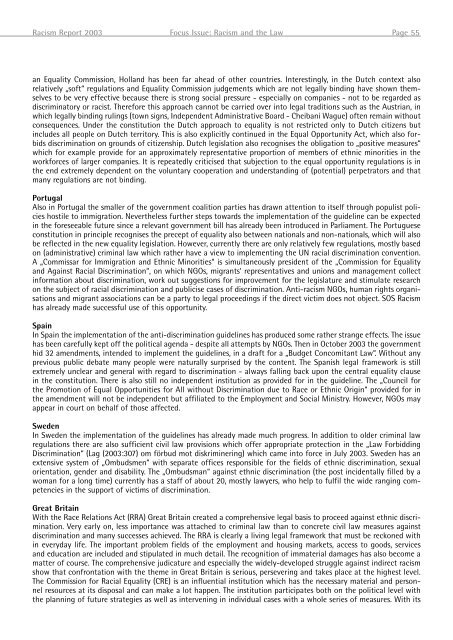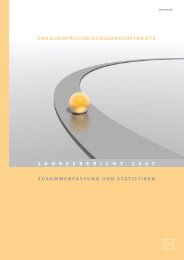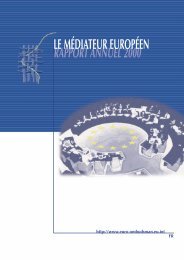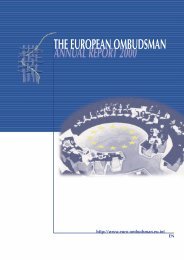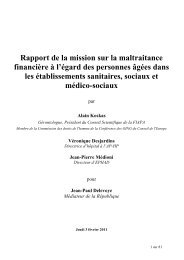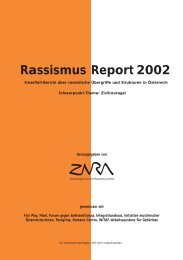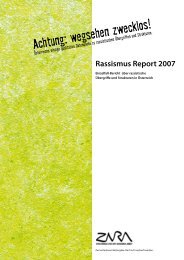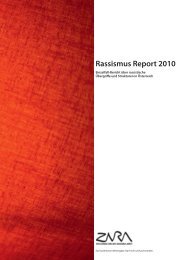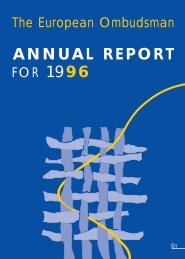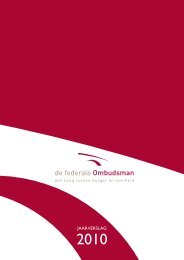Racism Report 2003 - Zara
Racism Report 2003 - Zara
Racism Report 2003 - Zara
Create successful ePaper yourself
Turn your PDF publications into a flip-book with our unique Google optimized e-Paper software.
<strong>Racism</strong> <strong>Report</strong> <strong>2003</strong> Focus Issue: <strong>Racism</strong> and the Law Page 55an Equality Commission, Holland has been far ahead of other countries. Interestingly, in the Dutch context alsorelatively „soft“ regulations and Equality Commission judgements which are not legally binding have shown themselvesto be very effective because there is strong social pressure - especially on companies - not to be regarded asdiscriminatory or racist. Therefore this approach cannot be carried over into legal traditions such as the Austrian, inwhich legally binding rulings (town signs, Independent Administrative Board - Cheibani Wague) often remain withoutconsequences. Under the constitution the Dutch approach to equality is not restricted only to Dutch citizens butincludes all people on Dutch territory. This is also explicitly continued in the Equal Opportunity Act, which also forbidsdiscrimination on grounds of citizenship. Dutch legislation also recognises the obligation to „positive measures“which for example provide for an approximately representative proportion of members of ethnic minorities in theworkforces of larger companies. It is repeatedly criticised that subjection to the equal opportunity regulations is inthe end extremely dependent on the voluntary cooperation and understanding of (potential) perpetrators and thatmany regulations are not binding.PortugalAlso in Portugal the smaller of the government coalition parties has drawn attention to itself through populist policieshostile to immigration. Nevertheless further steps towards the implementation of the guideline can be expectedin the foreseeable future since a relevant government bill has already been introduced in Parliament. The Portugueseconstitution in principle recognises the precept of equality also between nationals and non-nationals, which will alsobe reflected in the new equality legislation. However, currently there are only relatively few regulations, mostly basedon (administrative) criminal law which rather have a view to implementing the UN racial discrimination convention.A „Commissar for Immigration and Ethnic Minorities“ is simultaneously president of the „Commission for Equalityand Against Racial Discrimination“, on which NGOs, migrants‘ representatives and unions and management collectinformation about discrimination, work out suggestions for improvement for the legislature and stimulate researchon the subject of racial discrimination and publicise cases of discrimination. Anti-racism NGOs, human rights organisationsand migrant associations can be a party to legal proceedings if the direct victim does not object. SOS <strong>Racism</strong>has already made successful use of this opportunity.SpainIn Spain the implementation of the anti-discrimination guidelines has produced some rather strange effects. The issuehas been carefully kept off the political agenda - despite all attempts by NGOs. Then in October <strong>2003</strong> the governmenthid 32 amendments, intended to implement the guidelines, in a draft for a „Budget Concomitant Law“. Without anyprevious public debate many people were naturally surprised by the content. The Spanish legal framework is stillextremely unclear and general with regard to discrimination - always falling back upon the central equality clausein the constitution. There is also still no independent institution as provided for in the guideline. The „Council forthe Promotion of Equal Opportunities for All without Discrimination due to Race or Ethnic Origin“ provided for inthe amendment will not be independent but affiliated to the Employment and Social Ministry. However, NGOs mayappear in court on behalf of those affected.SwedenIn Sweden the implementation of the guidelines has already made much progress. In addition to older criminal lawregulations there are also sufficient civil law provisions which offer appropriate protection in the „Law ForbiddingDiscrimination“ (Lag (<strong>2003</strong>:307) om förbud mot diskriminering) which came into force in July <strong>2003</strong>. Sweden has anextensive system of „Ombudsmen“ with separate offices responsible for the fields of ethnic discrimination, sexualorientation, gender and disability. The „Ombudsman“ against ethnic discrimination (the post incidentally filled by awoman for a long time) currently has a staff of about 20, mostly lawyers, who help to fulfil the wide ranging competenciesin the support of victims of discrimination.Great BritainWith the Race Relations Act (RRA) Great Britain created a comprehensive legal basis to proceed against ethnic discrimination.Very early on, less importance was attached to criminal law than to concrete civil law measures againstdiscrimination and many successes achieved. The RRA is clearly a living legal framework that must be reckoned within everyday life. The important problem fields of the employment and housing markets, access to goods, servicesand education are included and stipulated in much detail. The recognition of immaterial damages has also become amatter of course. The comprehensive judicature and especially the widely-developed struggle against indirect racismshow that confrontation with the theme in Great Britain is serious, persevering and takes place at the highest level.The Commission for Racial Equality (CRE) is an influential institution which has the necessary material and personnelresources at its disposal and can make a lot happen. The institution participates both on the political level withthe planning of future strategies as well as intervening in individual cases with a whole series of measures. With its


